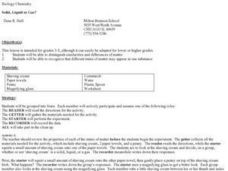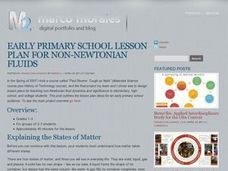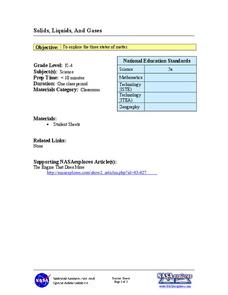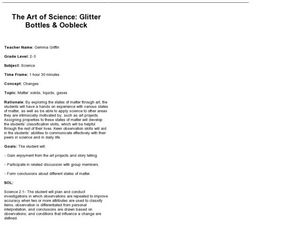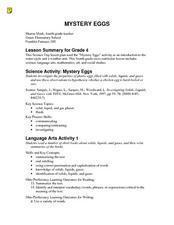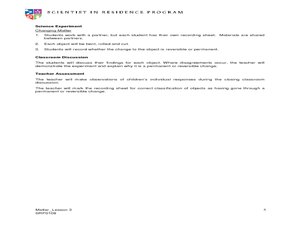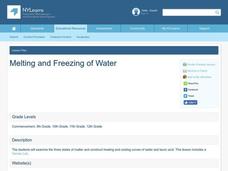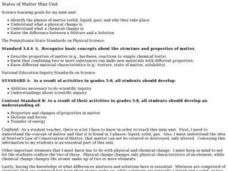Curated OER
Solid, Liquid, Or Gas?
Students identify physical characteristics and group objects for a picnic using the states of matter for each object and using literature to introduce the states of matter.
Curated OER
Cloud in a bag
Students relate the states of matter and clouds. In this environment activity, students create a chart of information they know about clouds. Students put an ice cube in a bag and tape to a window. Students watch for...
Curated OER
Non-Newtonian Fluids
Students will use water, cornstarch, eggs, and more to explore the different states of matter. They will make observations of an unknown substance called "Oobleck" and test its liquid and solid properties. This would be a great lesson to...
Curated OER
Solids, Liquids, and Gases
Students investigate and explore the three states of matter. They read and discuss the NASA article "The Engine That Does More," identify examples of each state of matter, and as a class complete a section of two worksheets. They...
Curated OER
Ooblek
Students demonstrate the three states of matter. In this matter lesson, students read Bartholomew and the Ooblek. Students create "ooblek" and discuss what state of matter it is.
Curated OER
The Art of Science: Glitter Bottles and Oobleck
After having a class discussion on the three states of matter, young scientists utilize the wonderful substance, Oobleck in order to experience something that changes states of matter. They also create "sparkle jars" which...
Curated OER
What State Are You?
Students identify three states of matter and recognize plasma as fourth state. They provide examples of matter that are classified in particular state and identify properties of each state of matter.
Curated OER
Physical and Chemical Properties of Matter
Students identify the physical and chemical properties of matter. They review the types of matter. Students list the four states of matter (Solid, Liquid, Gas and Plasma). They recognize and describe the different types of matter.
Curated OER
Matter for Minors
Students use streaming videos, web sites, and hands on activities students to explore matter. They focus on how temperature affects matter and what the particles look like in the states of matter.
Curated OER
Discovering the Properties of Matter
Students identify the properties of the three states of matter and observe the movement of Oobleck and be able to compare its movement to that of solids and liquids. They record in their Science Journal what they discovered about Oobleck.
Curated OER
Water 1: Water and Ice
Learners examine the changes as water goes from solid to liquid. In this states of matter lesson plan, students observe and record the changes to water as it changes from solid to liquid and back to solid.
Curated OER
Mystery Eggs
Students investigate the properties of plastic eggs filled with solids, liquids, and gases and use these observations to hypothesize whether a chicken egg is hard-boiled or raw.
Curated OER
United States Entry into World War I: A Documentary Chronology of World War I
Learners identify several important events that led to U.S. involvement in World War I. They examine different explanations, form an opinion about the evidence for each rationale and then create a slideshow to present their findings.
Curated OER
Ice Cream Blizzards
Fourth graders explore whether the making of homemade ice cream is a physical change or a chemical change in a lab experiment. Students identify states of matter, describe the physical properties of states, and collect temperature data...
Curated OER
Mixing It Up!
Third graders identify the different states of matter. In this science lesson, 3rd graders describe the different components of solutions and mixtures. They create emulsions, foams and suspensions in the lab.
National Endowment for the Humanities
Lesson 2: The United States, France, and the Problem of Neutrality, 1796–1801
While the French Revolution could be considered inspired by the American Revolution, it created thorny problems for the new United States. Should the United States get involved and be drawn into a European drama? Was the US strong...
American Chemical Society
Changing State: Evaporation
Why do experiments require a control? Guide scholars through designing an experiment to see what they can do to evaporate water faster with a lesson that stresses the importance of controlling all variables. The second activity...
Curated OER
Exploring Phases of Matter
Students discuss and experiment with the phases of water. In this phases of matter lesson, students recognize the different states of matter. Students measure and record changes and understand when the state changes.
Curated OER
Physical Changes to Matter
Pupils explore matter by conducting an in-class experiment. They experiment with water's various forms by melting and freezing water, identifying its new shape. These observations are recorded to supplement later discussion. They also...
Curated OER
Melting and Freezing of Water
Pupils examine the three states of matter. They identify the segments of heating and cooling curves. Students analyze data and create a graph to determine the freezing and melting temperature of water.
Curated OER
Chemical Wonders
Students read about and discuss how chemical engineers use different states of matter to create substances. For this chemical engineering lesson plan, students also give examples of the 3 kinds of matter.
Curated OER
Mixtures of Matter
Students experiment with mixtures of matter. In this matter lesson, students investigate which liquids form a solution when mixed together and which do not. Students also identify which solids can be separated from matter.
Curated OER
States of Matter Mini-Unit
Students identify he phases of matter (solid, liquid, gas), and why they take place. They comprehend what a physical change is and what a chemical change is. Students know the difference between a Mixture and a Solution.
Curated OER
Comparing Matter
Students use Internet to research and discover states of matter and explain how molecules are arranged in each state, complete Comparing Matter Work Sheet, and identify objects around classroom that fit three states of matter definitions.
